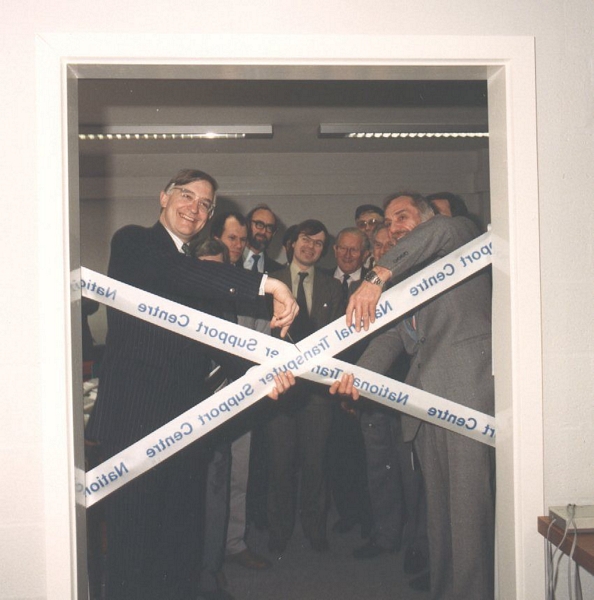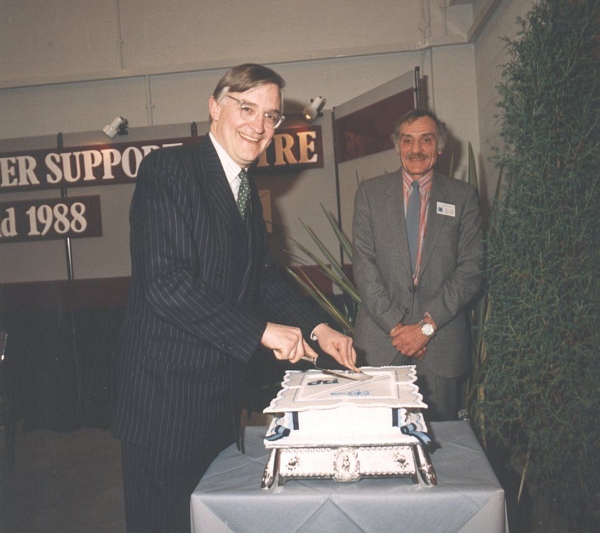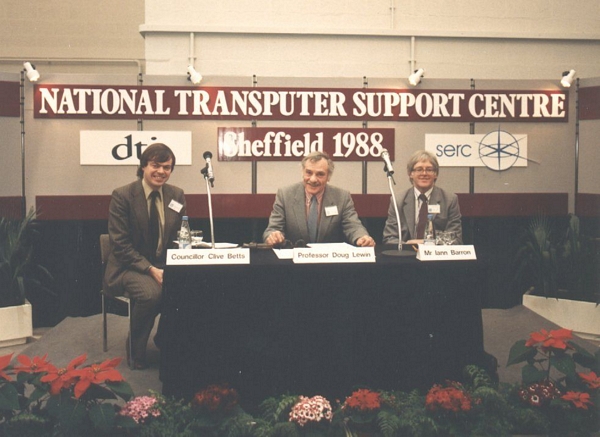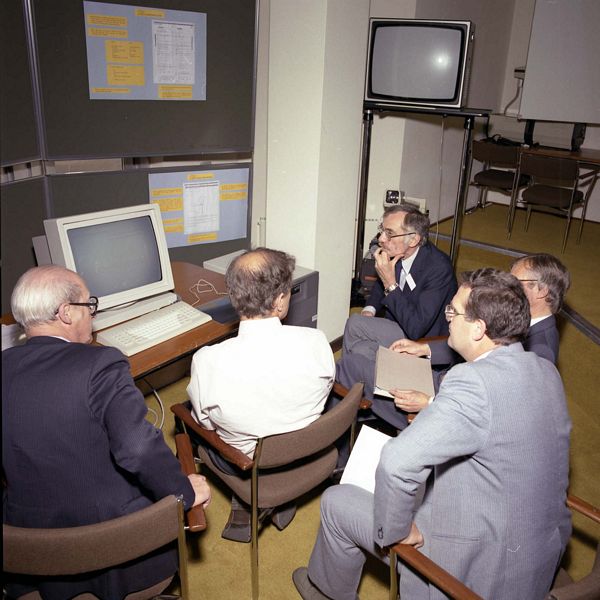


Robert Jackson, Minister at the Department of Education and Science with special responsibility for higher education and science, opened the National Transputer Support Centre based at the Sheffield Science Park on 7 March. The Centre will provide a focus for work on the transputer a superchip which promises a new generation of very fast, powerful computers operating around two hundred times faster than conventional micro-computers.



The Centre is part of the Science and Engineering Research Council/Department of Trade and Industry Initiative in the Engineering Applications of Transputers announced last year.
A collaborative venture involving Sheffield University and Sheffield City Polytechnic, the new Centre will be directed by Professor Douglas Lewin of Sheffield University.
The aims of the Centre are:
The aims of the Initiative, in which this Centre and five complementary Regional Centres will play an important part are:
Sheffield has an international reputation in research and technology and is the home of four major national industrial research associations as well as a University and Polytechnic, both renowned for working closely with industry.
Sheffield City Council is developing Sheffield Science Park in partnership with English Estates. The Park is supported by Central Government and the EEC and is already an active member of the United Kingdom Science Park Association (UKSPA).
The Science Park's management company reflects the partnership of interest, with representatives from Sheffield City Council, English Estates, Sheffield City Polytechnic, Sheffield University, BSC (Industry) Limited, ASTMS, Technor Limited and Midland Bank.
At its meeting on 3 March 1988, the Computing Facilities Technical Advisory Group (CFTAG) decided to seek bids for two specific short-term development contracts related to the recommendations of two of its recent Workshops. Both contracts should start on 1 June 1988.
In each case, the contract will be for a maximum period of 6 months and total cost not exceeding £10K (including overheads). The specific contracts on offer are:
Bids are invited to provide a concise report containing the following:
Bids are invited to carry out a survey and produce a report on pre- and post-processing software suitable for application to a wide range of engineering disciplines, in which the engineering analysis is carried out using Finite Element, Finite Difference, Finite Volume or Boundary Element techniques. The report should specify the machine ranges on which the software is available and its cost, and should indicate the suitability, or otherwise, of the software for a number of specified engineering disciplines and for analysis techniques above.
Bids (not exceeding 6 sides of A4) to carry out either of these should be sent to me by 27 April 1988. A decision on these will be made by CFTAG on 5 May 1988 and formal notification of the outcome of your bides) will be sent to you by 13 May 1988. Your bides) should include full details of the staff effort to be charged to the contract.
The final report, in each case, will be required to be submitted to me within one week of the end of the contract.
Regular readers of the Newsletter will be aware of the Central Server policy of the Computing Facilities Committee (CFC). During the next financial year (1988/89) a few (probably 3 or 4) will be purchased by CFC for placement in Engineering Departments or Faculties. This invitation to submit a preliminary bid for one of these servers is the first stage of the placement process. The initial provisions will almost certainly be Sun-3 based.
Your bid should not exceed 2 sides of A4 and should include brief details of the Department(s) bidding, existing and planned SERC (Engineering Board) Grants, existing single user systems provided on grants and from other sources, any servers already operating, local networking facilities and some estimate of the size of server you are bidding for (i.e. number of client slots, disk and memory size, etc.). These preliminary bids will be considered by the Computing Facilities Technical Advisory Group at its meeting on 5 May 1988, when a short-list will be selected to be invited to submit a more detailed bid on which the final placement decisions will be made.
Your preliminary bids should reach me by 27 April and you will be advised of the outcome of this by 13 May 1988. The detailed bids will be subject to a deadline of the end of August.
Two very successful tutorial days on X-11 were held at RAL on 9 and 10 March, with 120 people present on the first day and 100 on the second day. The tutorial lectures were given by three of the designers and developers of X-11 (Smokey Wallace, Charles Haynes and Phil Karlton from DEC, Palo Alto) who were flown over at SERC's expense.
The main points to emerge from the two days were:
These points will be brought to the attention of the Computing Facilities Technical Advisory Group at its next meeting on 5 May 1988.
Graphics workstations provide an environment in which human and computer can work closely together in a natural, efficient way. Software, if well-designed, can exploit this environment to make humans many more times productive. The Software Tools Centre was established in 1984 to provide such software.
The Centre, which is based at the University of Kent at Canterbury, has produced a general purpose set of Unix tools, each designed to benefit a wide class of users. The Centre is funded by the Computing Facilities Committee to act as a National Centre to support the SERC research community. The tools have been in use by this community since 1985, and are now distributed to over 100 sites.
Since the tools are designed t0 make all users more productive, they are just as applicable in industry as in Universities. The Centre is, therefore, now marketing its tools as commercial products, and counts among its current customers Plessey, STC, DEC, British Telecom and ICL.
UPS is a graphical debugger for C programs. It is both a post-mortem and a run-time debugger. UPS needs no typed commands; all interaction is by pointing to and/or editing fields on the screen, or selecting menu options. For example, to display the value of a variable the user simply points to its name within the source code listing.
UPS can display all C data types, including structures, enums, multidimensional arrays, pointers, etc. Structure variables can be expanded to show their contents, pointers can be followed, all at the touch of a button.
Program source is displayed in a scrollable window with the current position highlighted. The user has options such as execute to here to allow easy stepping through the execution of a program.
A version of UPS for Fortran programs is currently under development.

FS is a graphical file system editor that provides a powerful alternative to mv, rm, cp, chmod, etc. It allows the user to interactively edit filenames, permissions and ownerships. Files can be copied, moved deleted and undeleted, directories can be moved or copied, symbolic or hard links can be created, all with a minimum of effort.
For example, to move files from one directory to another, the user simply has to point to the files, select move from the menu, and then point to the destination directory; the files will then be moved.
VDIFF presents the differences between two files in a clear, easy to understand, graphical way. The two files are displayed side by side in scrollable windows. Differing text is highlighted and boxed. Connecting lines are drawn between corresponding text.
Each file has a map beside it showing what is currently being displayed and where the differences are. The user can navigate through the text by scrolling, or simply pointing at the map.
VDIFF also provides a simple facility for combining the two files into a final merged version.
VF is an intelligent browser. It recognises most Unix file types and displays them in the appropriate manner. For example, a tar file is displayed as a list of file names and bitmaps are displayed as pictures. VF also recognises ar files, object files, cursors, icons, directories, etc. It can also, of course, display text.
GUIDE is a structured document browser that can handle a mixture of pictures and text. Hypertext buttons can be expanded by pointing to them. In this way, users can expand the parts of a document they want to see; the current state of a document can be saved at any time.
Pre-processors are available to convert conventional documents into GUIDE documents. For example, guide -m can be used to read conventional Unix manual pages.
RTP is a highly interactive real-time profiler for programs written in C and/or Fortran. Unlike other profilers, RTP shows where time is being spent as the program is running. A constantly updating histogram shows where time is being spent in each routine, and in each source-line.
The user is presented witl1 a scrollable list of functions and a scrollable source listing, both overlaid with a histogram showing where time is being spent.
Time spent in low level routines can be folded onto higher level routines, thus giving a clear idea of which parts of the program are taking the time.
FORM provides a menu driven environment for processing Fortran source code. Facilities provided include the automatic declaration of all variables, transformation of real variables to double precision and vice-versa, conversion of Hollerith to string constants, and modification of expressions to optimize their evaluation.
Processed files can be viewed between operations and are formatted to a user-defined standard.
FORM is currently being expanded to add more functions including operations to improve Fortran performance on vector architecture machines.
All the tools, with the exception of UPS, run on most workstations supporting Unix and the X-window manager. In addition they run on Sun2 and Sun3 workstations under Sunview. the UPS debugger runs on an expanding set of machines including the Sun3 and the VAX.
The Computing Facilities Committee is currently funding a 3 year development contract at the AI Applications Institute, Edinburgh University, for the support of AI/IKBS for engineers.
This article describes the training courses under this contract that are available free of charge to researchers and students who are working on SERC funded projects. The courses are divided into two technical levels: Fundamentals of AI and Advanced AI. The Fundamental AI Courses have no specific prerequisites other than a general awareness of information technology and a willingness to learn. On the other hand, the Advanced AI Courses have specific prerequisites which are clearly identified below. All short courses are held on a regular basis, usually every three months, throughout the year.
Planning and Search The introduction to planning and search course is a two day module. Two fundamental problem solving strategies are presented: state space search and problem reduction. The need for search in problem solving is described and various search algorithms (heuristic and otherwise) are covered. The basic issues in planning are discussed in detail using existing systems in the literature as exemplars. These issues include representations for plans, techniques for constructing plans, and the role of search.
Expert Systems This two day module enables the attendee to understand the fundamental issues involved in the building and using of expert systems. The essential aspects of knowledge representation formalisms are taught and four major expert systems are described.
AI Programming Paradigm The aim of this module is to highlight the similarities and differences between the various programming paradigms used in building knowledge based systems. The three paradigms covered are rule-based programming, logic programming and object-oriented programming. This is a five day module with both lectures and practicals.
Edinburgh Prolog This is a five day course comprising both lectures and practical sessions. The aim is to provide the practical knowledge needed to write and understand Prolog programs, based on an understanding of the relevant theoretical issues. The course is suitable for anyone who wishes to obtain a working knowledge of the Prolog language, whether with a view to writing software in Prolog or simply assessing its relevance to their particular applications area.
These are very intensive courses and as such attendees with no previous experience will find them fast paced and quite likely too demanding. However, in certain instances our fundamental AI courses can act as a lead-in to them.
Common Lisp This is an intensive five day course on programming in Common Lisp. The course is suitable for anyone who wishes to obtain a working knowledge of Common Lisp with a view to writing software. Attendees should have a practical working knowledge of one or more programming languages.
Introduction to ART ART is introduced over a two day teaching period. It is aimed at giving the experienced AI programmer a clear idea of the particular capabilities of this major system, before embarking on project work.
Introduction to KEE This is an introductory teaching session designed to show the attendee the application areas of KEE and its specific major features. It is expected that the attendee will already be an experienced AI programmer.
Introduction to Knowledge Craft The Knowledge Craft introduction lasts two days and highlights the key features of the system. Even though this is an introductory session it is expected that the attendee will already be an AI programmer.
These Introductions to the major AI toolkits are concentrated two day sessions. Attendees should ideally have:
Following a two day introduction, attendees are encouraged to stay and use the system on a trial project.
Expert Systems 7 -8 April, 8-9 June, 5-6 October, 7 -8 December
Planning and Search 12-13 October
AI Programming Paradigms 11-15 May, 20-24 June, 10-14 October
Prolog 13-17 June, 12-16 September, 12-16 December
Lisp 19-22 April, 27 June - 1, July 17-21 October
Introduction to ART 25-26 April, 24-25 October
Introduction to KEE 3-4 May, 27-28 October
Introduction to Knowledge Craft 28-29 April, 1-2 November
All courses are held at AIAI, Edinburgh.
Release 3 of the Finite Element Library is now ready for distribution. The NAG/SERC Finite Element Library has now been in use for about four years and in this time there have been a number of very useful comments and suggestions made on the Library's contents. With this release of the Library, Release 3.0, it is hoped that some of the needs expressed in these comments will be met. This article gives a brief indication of the new material in the Library.
Many of the new routines to be included are intended to extend the analysis capabilities of the Library. The use of many of them is illustrated in the new Level 1 programs. The main thrust has been to include routines to handle complex arithmetic and also more general assembly routines.
There are six additions to the program library at Release 3.0. The new programs extend the current application areas and add two programs to a new nonlinear section.
Although Release 3.0 has only just been announced, Release 4.0 is being planned and work has already begun. The final contents of Release 4.0 will depend to a certain extent on user pressure, but the main thrust will be in non-linear problems in the form of more Level 1 Library programs.
This year it is intended to make a set of pre- and post-processing routines available on a trial basis together with two solutions of the Navier-Stokes equations.
Release 3.0 will be mounted on the remaining Primes and can be made available on other SERC machines on request. As the direction in computing hardware is toward single user systems, a version of the Library is also available for Sun workstations.
The Library will be made available on other machines, such as the RAL IBM or Cray, if there is sufficient interest.
Engineering Computing User Group Thursday, 26 May 1988 Rutherford Appleton Laboratory
Alvey Vision Club Conference 31 August - 2 September 1988 Manchester University